 For some, pronouncing the Spanish R comes easily and naturally. But for others it takes practice and patience. If you fall into the second camp, prepare to have all your pre-conceived notions about Spanish pronunciation shattered in just a matter of minutes. Ok, maybe that's a bit dramatic, but nevertheless, this technique has never failed any of my students. So get ready because this could be the blog post that sets you free. In just a few minutes, it's very possible you'll be rolling your R's like Lou Diamond Phillips singing La Bamba in my favorite move from 1987. The hard English "R" In English we use what I call the "hard R", which is best depicted in a pirate's growl..."Arghh". This is an extreme example, I know, but I use it to emphasize what you don't want to say when speaking the Spanish R. English words such as "are", "senior", and "air" are additional examples of what not to use as your guiding examples when learning the Spanish R. The Spanish "R" Contrast those with the Spanish "R", which is much lighter, faster, and delicate. At its essence, the Spanish R is pronounced when a small puff of air coming from your through that--with the tip of your tongue lightly touching the roof of your mouth--pushes your tongue forward just slightly enough for the air to escape. This action makes a little bump sound, which is the sound you want to target. The proper double R sound can be produced by a rapid repeat of this motion, where your tongue flaps back and forth near the roof of your mouth as one by one little pockets of air escape rapidly (what I refer to in the video below as the helicopter or cat sound). Para Think of the Spanish word "Para", which means "to", "for", or "stop". English speakers will have a tendency to pronounce it "Par-uh", which is incorrect. The correct pronunciation is more similar to "Pod-uh". As a first step, you can simply replace the "R" in "Para" with an English "D" and pronounce it "Pod-uh". Notice how when you say it correctly this way the tip of your tongue naturally finds its place near the roof of your mouth for a split second. This first step in itself should prove that you can roll your R's! The next piece is to repeat "Pod-uh" over and over again as you slowly lighten the degree to which your tongue touches the roof of your mouth each time you say "R". Start repeating the word slowly and don't be afraid to over-emphasize each letter at first so you can really feel your tongue strike upward against the top of your mouth...POD-uh, POD-uh, POD-uh... Gradually speed up the repetition and as you do, scale back the force of each tongue strike. In English we have heavy, forceful sounds, so training your mouth muscles to be lighter and more delicate may sound funny, but it's a big part of proper pronunciation as well as developing an authentic Spanish accent. Repeating this exercise will train the muscles in your tongue and mouth to get more agile, soft, and quick. I like to compare this to a soccer player who begins with heavy, solid feet, without a lot of control. But over time she learns to be light and soft on her feet to really glide swiftly with the ball. Udder and Butter Two more examples of words that can help you develop this technique are "udder" and "butter". Repeat the exercise above with these two words. As you say them faster and faster and as your tongue becomes lighter and lighter, drop the "-er" and simply extend the "d" and "t" over and over again, like this: uddddddddddd and buttttttt Doing this exercise with these two words will specifically help improve your ability to roll the double R. The video below will explain this with more clarity, but the desired objective is to make the helicopter sound. This technique has helped lots of students, many of whom were convinced they would never learn to roll their R's. Instead of stopping here, watch the video below to actually hear these sounds and practice rolling the Spanish R and double R with me. Some people may wonder if it would be more effective to learn Spanish by actually going to a Spanish speaking country and learning the language through immersion. While there are immense benefits to being able to immerse yourself in a language and culture, there are a couple drawbacks too that you should be aware of. So in the spirit of simplicity, here is the eSpanishTeacher list of pros and cons for learning a language by living in a foreign country.
Pros 1. An experience you will likely never forget 2. You will meet amazing people that will become lifelong friends 3. You'll gain an appreciation for new cultures, customs, new ways of thinking, and new perspectives on life; you're also likely to increase your appreciation for diversity of thought, value systems, social structures, etc. 4. Not only will you learn the language, you'll pick up the regional accent, slang, vocabulary, and linguistic nuances specific to that region. Cons 1. You will surely miss out on learning the structure of the Spanish language. In a formalized learning setting you'll be taught the construct of the language, how communication is put together, rules for structuring sentences, grammar, pronunciation, agreement, irregular uses of certain words, etc. For many students, this foundation is essential as a jumping off point for reinforcing confidence and further development of language skills. If you miss out on this, you may find yourself asking basic questions down the road and lacking the confidence you need to refine your speaking skills. 2. Whether it's pronunciation, grammar, or vocuabulary, you may form bad habits that are difficult to overcome. 3. Similar to #2, you may learn uses of words or rules that are unique to your specific region and when you travel outside that region you could be so entrenched in "your way" of communicating that you are unable or unwilling to pivot and adapt to the new region's way of communicating. 4. Living away can be costly and can disrupt balance in your life. While some people jump at the chance for new adventures, a move to a foreign country to learn a language would require one to dedicate many months at a minimum to the endeavor. Proficiency in Spanish is not something that can be achieved in a matter of a few weeks. Uprooting your life to live abroad has some very real ramifications that need to be considered, to name a few: -leaving/changing jobs, finding employment -legal status in the new country -safety concerns -travel restrictions -financial considerations -diet and lifestyle changes So while learning a language by physically moving and immersing yourself in another country's culture could be a wonderful experience, there are realities that should be considered. Many new Spanish speakers hear "usted" used by other Spanish speakers, but often don't know what it means, when to use it, and how to use it. "Usted" is simply another subject in the Spanish subject chart and it means "you". Wait, does that mean there are two subjects that both mean "you" in Spanish? Si, señor (yes sir). So at this point the important question to answer is when and how to use Usted. Ana is going to answer all those questions for you in the video below. ¡Buena suerte! Here is a summary of 25 important verbs all Spanish speakers should learn as early as possible. If you are equipped with a small number of important Spanish verbs, you'll be surprised how much you can actually say. Learning these is a much more effective approach than simply memorizing a few phrases to get around town.
Remember that you'll receive the eSpanishTeacher 101 Spanish Verbs course when you purchase our Beginner Spanish course. This course will teach you to use the 101 most common verbs in the entire Spanish language and you'll get plenty of practice speaking out loud. Learn Spanish on Amazon Learn Spanish on eBay Learn Spanish on Groupon Learn Spanish online with Udemy You need to learn Spanish from a specific region of the world or a specific Spanish dialect, right? You're not interested in learning Spain Spanish 'cause you're traveling to Mexico or maybe visa versa. The truth is that there are roughly 21 countries where Spanish is the official language and many more where Spanish is commonly spoken. Additionally, inside each of these countries there are provinces and regions where the dialects vary widely. Given this reality, how are you supposed to find a Spanish language program that targets the specific region within the specific country you'll be traveling to? LangFocus has a great explanation of all the various Spanish dialects. He supports what we've always said that students should learn the mechanics of Spanish first. Then, once they are grounded in the basics (grammar, vocab, usage, number/gender agreement, pronunciation, etc), they can start learning and immersing themselves in the regional Spanish dialects, slang, and other language quirks. In other words, learn the language rules first and then you'll be in a position to break them. Spanish originated in the Castille region of Spain and as it migrated further and further from that area the language evolved. Despite regional changes, grammar rules and the language mechanics are fairly consistent throughout the world, which is what the eSpanishTeacher program teaches. Once you're interfacing with Spanish speakers from a given region, it won't take long before you pick up on their slang, dialect, accent, and more. For more Spanish help, visit these great language resources: Learn Spanish on Amazon Learn Spanish on eBay Learn Spanish on Groupon Learn Spanish online with Udemy 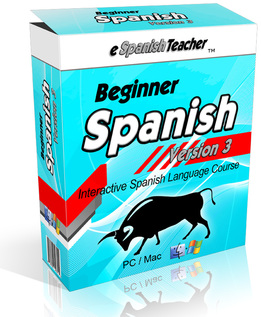 After six months of planning, design, & development, we are pleased to announce the launch of our revised & refreshed Beginner Spanish Version 3! The team at eSpanishTeacher is extremely proud of this product and know that our customers will love it too. Boasting improved audio, more effective visuals, more comprehension exercises, and 4 brand new lessons, Beginner Spanish Version 3 is the complete package for folks wanting to learn to speak Spanish quickly. And like previous offerings, Version 3 ships with 101 Spanish Verbs as a free bonus! So you get even more great Spanish instruction in a personalized setting with from an actual Spanish teacher for the same great price. That's right, we're giving you more language learning content without increasing the price. This is a no brainer for people wanting to learn Spanish or brush up on speaking skills you haven't used in some time. Past customers have told us that the course also works for younger audiences. So don't wait any longer. Click here to start learning and speaking Spanish today!  "Poder" is one of the most common verbs in the Spanish language. It's perhaps the most important verb for you to know. It means "to be able to" or "to can" (I can..., she can..., they can...). If you turn on a Spanish TV channel like Telemundo or Univision, you'll hear various usages of "Poder" in nearly every sentence. A few examples: Si se puede = yes you can Se puede [insert verb here] = You can ... Tú lo puedes hacer = You can do it There's a common usage of "Poder" that will help you be a more refined Spanish speaker that I want to cover today. Lots of people will say things like: Podemos trabar para tí = We can work for you ¿Puedes darme el libro? = Can you give me the book? Usted puede venir conmigo = You can come along with me These statements are a result of the speaker attempting to translate directly from English to Spanish. It can be tempting to do this and in many cases it's fine. And I want to be clear that the examples above are not incorrect, rather there are better ways to communicate the three statements above without using "Poder". Try this instead: Trabajamos para tí = We'll work for you ¿Me das el libro? = Will you give the book to me? Tu vienes conmigo = You come along with me (this is good because it's not quite a strong as the command, "Ven conmigo") The point of this post is that while "Poder" is one of the most fequently used verbs in Spanish, sometimes English speakers have a tendency to overuse it. So if you ever find that you're saying things like ¿Puedes ayudarme? = Can you help me? Puede ella tocar el piano? = Can she play the piano Stop and think for a minute how you might say it without using "Poder" ¿Me ayudas? = Can you help me? ¿Toca ella el piano" = Does/can she play the piano? Supplemental to the above, here is the spanish conjugation for Poder: Poder = To be able to / To can Yo puedo = I can Tú puedes = you can Él puede = he can Ella puede = she can Usted puede = you can (formal) Nosotros podemos = we can Vosotros podéis = you guys can Ellos pueden = they can (group of males or mixed gender) Ellas pueden = they can (group of females) Ustedes pueden = you all can Articles may sound confusing, but they are easy to understand. Most people don't know that articles are perhaps the most common words in the English language: "A" and "The" and "Some".
Singular articles: A - un, una The - el, la Plural articles: Some (plural of "A") - unos, unas The - los, las Like adjectives, articles must agree in number and gender with the nouns they modify, for example: Un libro - A book (notice that "Un" is singular and masculine to match "Libro" which is also singular and masculine. Una mesa - A desk ("Una" is singular feminine because it modifies a singular feminine noun, "Mesa") Unos libros - Some books ("Unos" is plural and masculine, so is "libros") Unas mesas - Some desks (Same thing here, "Unas" is plural and feminine to match "mesas", the noun it modifies)  In Spanish, adjectives that modify a noun must agree in number and gender with the nouns they modify. This is true in English too. Here is an example: The house is small Notices that house and small are both singular. In Spanish, this is easier to understand: La casa es pequeña - the house is small (casa and pequeña are both singular) And this: Las casas son pequeñas - The houses are small (notice that casas and pequeñas are both plural; so too are las and son for that matter, but we are confining this conversation to nouns and adjectives) This concept may seem basic, but it's an easy one to forget or skip over. And it gets more difficult when the noun you use doesn't end in "o" or "a". Take for example: El párque es grande - The park is large And this: Los párques son grandes - The parks are large (Noun: párque and adjective: grandes are both plural) The noun does not end in "o" or "a", so determining gender can be a bit more difficult, but the adjective must still agree in number and gender with the noun it modifies. 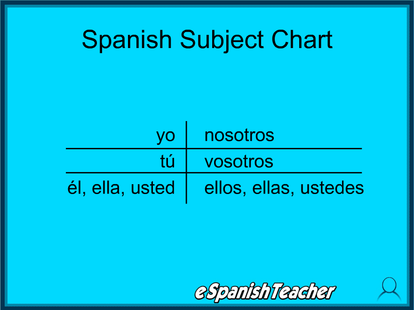 As a student Student of the Spanish language, one of the first things you'll learn is the subject pronoun chart or table (see graphic). This is a simple chart that displays the eight Spanish subject pronouns. For simplicity's sake, I refer to these as the Spanish subjects. On this blog post, I want to focus on two Spanish subject, "Usted" and "Tú". Both mean "you", however, they are used in different circumstances. Tú First, we'll start with "Tú" because it's the more common of the two subjects. It's used most often and has the meaning that is most similar to your understanding of "you" in English. This is the version of "you" that is used in friendly, less formal situations where you likely have close or casual relationships with the people you are speaking with. It's also used in informal social settings, like going out to dinner with friends or people who are roughly your same age who you might not know. Examples: Tú eres mi amigo = You are my friend Tú cantas con mi padre = You sing with my father Usted Of all the Spanish subject pronouns, "Usted" is perhaps the most difficult to understand, which is why we need a solid understanding of of "Tú" first. Usted means "you" but is considered the formal version of "you" and has the added effect of giving an extra level of respect or formality to the person with whom you are speaking. In other words, use Usted when you are speaking with someone in a formal setting or someone who deserves an added degree of respect beyond your every day accquantiances, friends, and family. Whether or not someone deserves an added level of respect varies based on who you are, your level of familiarity, your respective ages, and social status. You're probably asking yourself, "Does the Spanish language discriminate based on social standing?" The answer is a simply yes, it does. Usted es mi jefe = You (formal) are my boss Usted tuviste mucho éxito durante el año pasado = You (formal) had a lot of success last year If you a college student, you'd likely address your professors using "Usted". Likewise, if you were speaking with a government, corporate, or religious official, you would likely address that person using "usted". And in some case, you speak to the elderly using "Usted". There are exceptions to all these rules, but this is the general idea. Newer, less friendly relationships would lend to using Usted. Also, high-ranking officials in any organization would expect to be spoken to using "usted", at least until you became more friendly with the person. You would also speak to police officers and other public employees using "Usted". Friends and family typically would not speak to each other using "usted", unless it's a very young person speaking to his/her grandparent or parent. A teenager likely would not use Usted when speaking to a parent, however, a younger child might when being scolded. Likewise, bumping into someone on the street or in a store would not be an occasion to use "Usted". A good rule to follow is that the less familiar you are with someone that you meet in a formal or professional setting, the more likely you should use "Usted" until you become more familiar. Don't worry if you get it wrong. The best way to perfect your understanding of these two subjects is to use them a lot in your daily practice. |
AuthorThis is where we chat about all things Spanish. Feel free to ask a question, challenge me, passionately disagree, or rant about whatever. Just make it interesting. Archives
August 2018
Categories
All
|

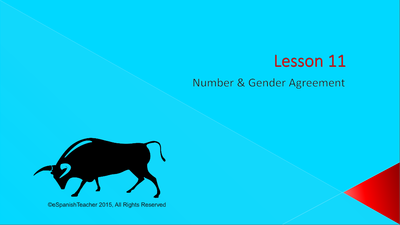
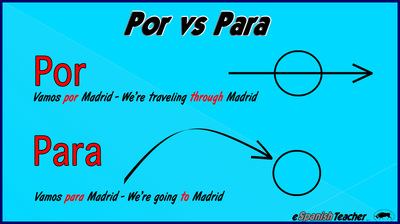
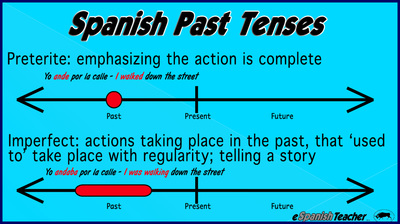
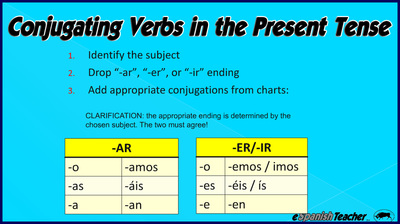
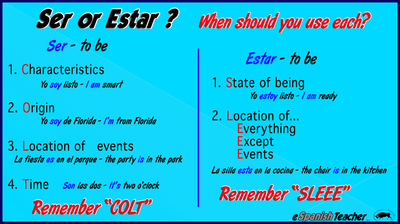
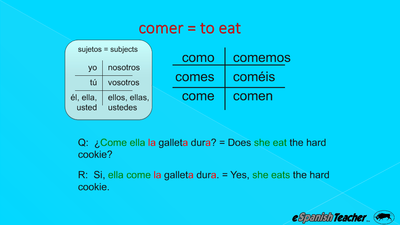
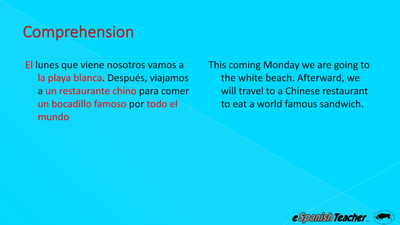
 RSS Feed
RSS Feed
